Skeptical Science News: The Rebuttal Update Project
Posted on 14 February 2023 by John Mason, BaerbelW, Ken Rice, Doug Bostrom
We are pleased to announce that a major new project is well underway at Skeptical Science. The work involves not only updating our popular rebuttals for the most-used climate myths but also adding entry-level sections to each topic, thereby widening the accessibility of the resource to as many folk as possible. And we want you, the readers, to join in with the project.
Some context
Why was Skeptical Science put together in the first place? Because of climate science deniers. Who? Deniers, or denialists, are people motivated to argue against reality. Climate change is just one example of a topic that attracts such attention. Previously, campaigns were run, for example, to gloss over the harmful effects of tobacco smoke. Tellingly, some of the same actors were involved in both campaigns.
What was the root cause of climate science denial? Profit, or more precisely perceived loss of profit. The response of the fossil fuels sector to the perceived changes required to address global warming was to engage in a concerted campaign to play down its seriousness. Climate change thereby became politicised. Creation and circulation of the political talking-points was easy: the pre-existing network of free market and Conservative-leaning think-tanks and media channels was ready and waiting.
Talking-points were carefully crafted and then tested with focus groups to determine their “stickiness” - meaning that a sticky message would take hold in peoples' minds, no matter how untrue it was. They were not messing around. In this game, all that was needed was to spread doubt and confusion.
From this embryonic start, climate science denial spread like a deadly plague. Books, bogus journals, fake conferences and documentaries also played their part as people increasingly fell victim to the onslaught of misinformation. Those actively promoting climate change denialism (Tier 1 deniers) relied on such an effect taking place: they needed a citizens' army to repeat those sticky messages (Tier 2 deniers) and they got one.
For those interested in further reading on this matter, well-documented in its entirety, it’s worth getting hold of a copy of the excellent book, Climate Cover-up, by James Hoggan and Richard Littlemore. It has aged well since its publication in 2009 - by which time much of the damage had been done. The first chapter is available here in PDF format as a taster.
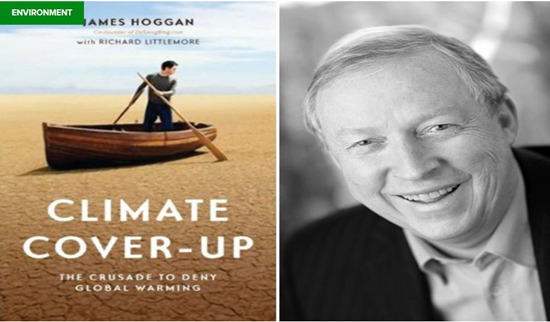
Above - Front cover of Climate Cover-up - an account of how the organised climate change denial campaign evolved. As Bill McKibben commented about that campaign: “Forget about the crime of the century – this probably qualifies as the crime of the geological epoch.”
Skeptical Science, founded by John Cook in 2007, was always the David fighting Goliath in this very unevenly-sided battle, but it has continued to root out misinformation ever since its inception. Its aim was always to provide a science-based response to climate science denialism. It was a remarkable, even heroic effort, built by a small but determined team of volunteers.
Updating our rebuttals
Our well-used database of denialist talking points has had over 36 million views since 2017 alone. The database carries entries on over 200 climate change denial talking points, referred to as “Myths”, and the science-based rebuttals to each of them. Many of these rebuttals date back to 2010 or earlier and in some cases developments in science have rendered these originals out of date (and the myths even more ridiculous). We started an updating programme some years ago, but now we are taking a more structured approach.
We decided that rather than fix these rebuttals in an ad-hoc fashion, a full review would be useful as a first step. The review found that most rebuttals lacked an entry-level version, an easy read for people unfamiliar with the terminology and methods of science. This is a major accessibility issue. Some rebuttals had a “basic” version but no “intermediate” or “advanced” equivalents. In other cases, there was only an intermediate entry. Some basic-level rebuttals were written in a more accessible style than others. So we have identified a number of tasks to undertake.
As an initial step we took a sample of the most frequently-read rebuttals and updated them to include entry-level versions. These “at-a-glance” sections are short (ideally under 500 words) and written in a style intended to hold the reader from start to finish.
Three key principles are employed with the “at a glance” sections, based on the assumption that we may at times be visited by readers who are interested but who are relatively new to the subject. Firstly, we strive to write engagingly, as if we are having a friendly fire-side conversation, using analogies with everyday life where possible. Secondly, we try to avoid anything that could be distracting such as links or anything off-putting like unnecessary or unintroduced technical terms. Last but not least, the end of each short rebuttal should be memorable, so it sticks in the reader’s mind.
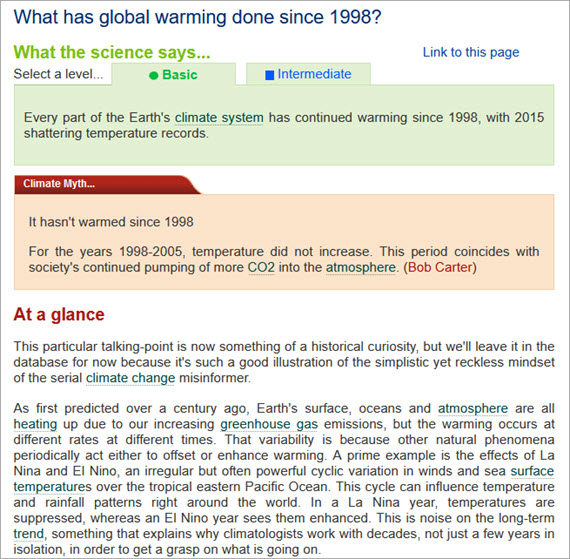
Above - a new-style rebuttal for a well-known climate myth now including the "at a glance" section.
Beneath each such entry-level section is the existing “basic” rebuttal, updated where necessary and headed “Further details”. The reader will therefore already be in the existing system, familiar to regular readers of Skeptical Science, that includes links to the more heavily-referenced intermediate and advanced-level rebuttals. Note that some excellent updating work has already been done – but only for some rebuttals.
This first batch of new rebuttals is a pick from a larger number we have completed. They were selected to provide a range of topics that vary in their complexity. At one end there are frankly daft statements like "the climate's changed before". Daft because it's a meaningless statement to make, without revealing what happened when it did. At the other, we deal with contentious claims such as the greenhouse gas theory breaking the second law of thermodynamics, where a minor treatise is required to explain Earth's energy budget and heat transfer within the atmosphere. It's easy to create denialist talking-points about such things but it's a lot harder to properly rebut such claims because it becomes necessary to tell the reader what is actually going on.
Many advanced rebuttals are pretty much journal-standard pieces, often written by a specialist working at that level. Based on our stats, the demographic that reads these is relatively small. Our priority for this first round of updates is therefore to add an at-a-glance section to each basic rebuttal and applying updates to these and the intermediate rebuttal versions as needed. After all, the vast majority of people we need to reach exist outside of the world of science and almost certainly outside of climate science, where the consensus that humans are causing global warming is very strong indeed. If we are to create a resource that is universally useful, we need to address that particular point. Nevertheless, if you once authored an advanced rebuttal and feel you can now add an update, then please feel free to get in touch with us!
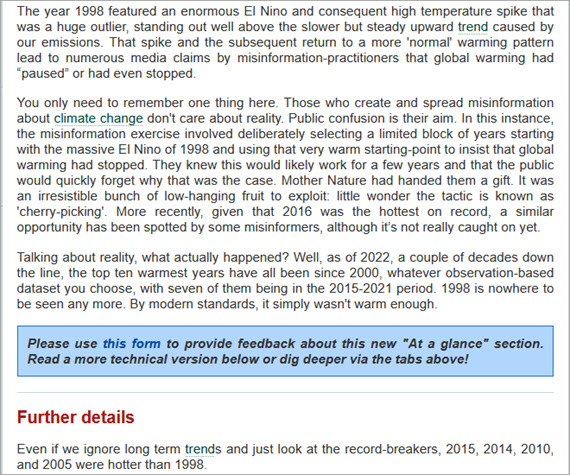
Above - another section of the same rebuttal, with the feedback form linked above "Further details".
Quality Control-CHECK
Where do you, our regular readers, come into the equation? Well, before we further develop this system, we would like to get some feedback from you. A special kind of feedback in fact. We invite you to look at the selection of rebuttals we've now completed and fill out the Google-form you’ll see at the end of “at a glance” in the blue box. We’d also very much appreciate it if you shared our ask with friends and relatives to read the at-a-glance sections and to gauge their usefulness by providing feedback as well. We want to know whether those short pieces have improved their understanding of climate-related issues.
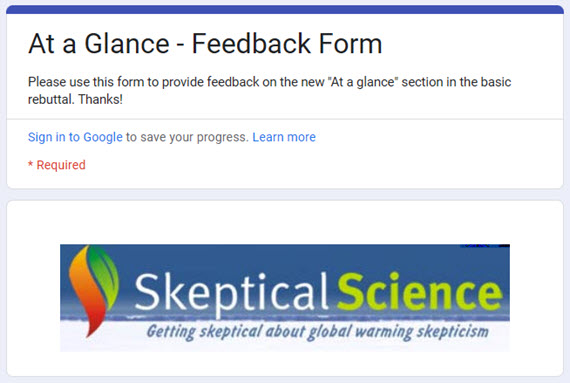
Ideally, the people you forward this to will be from outside the world of science and ambivalent with regard to the whole area of climate change. Why? We want to determine how we can play our part to help people understand, especially those in a fence-sitting position (a huge demographic), why action on climate change is so important. Get enough of those on-board and a movement becomes a torrent. Please follow the links below to view the updated rebuttals.
If you think that projects like these rebuttal updates are a good idea, please visit our support page to contribute!































 Arguments
Arguments






















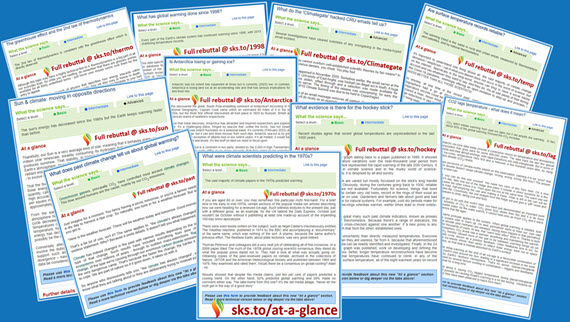









John, Baerbel, Ken & Doug:
Kudos for taking on this much needed and somewhat overdue task. I will help out as much as I can.
John, Baerbel, Ken & Doug:
I have been sifting and winowing through the internet for more than a decade now to identify quality news articles about manmade climate change and related matters.* During this time, I have seen a signifigant growth in debunking articles generated by journalists, scientists, blog authors, and others.
One such article was posted just two days ago. It is:
Myth-buster: Why two degrees of global warming is worse than it sounds by Daisy Simmons, Climate Explained, Yale Climate Connections, Feb 13, 2023
In the context of the rebuttal update initiative described in the OP, I thought it would be interesting to see which of the Skeptical Science (SkS) rebuttals Simmons' article best pairs up with. It appears that would be the SkS rebuttal, #3 It's not bad.
Having said the above, the existing SkS rebuttal, #3 It's not bad covers almost the complete universe of climate science. Therefore, the best Advanced version of the rebuttal would in essence be the most recent scientific report of the IPCC.
My basic recommendation re this ball of wax is to slice and dice the the SkS rebuttal, #3 It's not bad into distinct chunks.
___________________
*The first SkS "Bi-Weekly News Roundup" was posted on Nov 16, 2012.
John - thanks for the imput. "It's not bad" is in our next batch i.e. at an advanced draft stage and bearing in mind what you said, we'll likely take a look sooner rather than later.
John M, Baerbel, Ken & Doug:
As an aside, I have noticed a welcome and recent uptick in the number of news media outlets which are now generating their own versions of rebuttals of climate pseudoscience. A case in point is the national newspaper, USA Today. It's most recent rebuttal:
Fact check: False claim the rotation of Earth's core is responsible for climate change by Eleanor McCrary, USA Today, Feb 14, 2023
I believe this "fact check" directly relates to the SkS rebuttal, What influence do underground temperatures have on climate?
John M, Baerbel, Ken & Doug:
At the risk of preaching to the choir, I believe the Climate Feedback website offers a rich lode of high quality rebuttals which can be mined by SkS volunteers working on the rebuttal project you have set forth in the OP.
In addition to the uptick in media rebuttals of misleading claims (mentioned by John Hartz @4) there is a new Canadian development trying to combat misinformation that started in 2020. It is called Science Up First (website https://www.scienceupfirst.com).
Their initial focus was on health issues, particularly COVID-19 misinformation. But they are expanding their scope.
Their "Shareable Content" (see their webpage) includes a presentation of a climate science related example of how they try to counteract misinformation. I am not an Social Media participant so I do not know how to share it here. But it can be found by going to their "Shareable Content" and selecting either the "Data Misrepresentation" or "Environment" sub-sets.
Mayby synergy could be developed between SkS and Science Up First as part of the Rebuttal Update Project, or be developed as a separate project.
As a 'way-outside' thought, that I have no technical ability to evaluate or help develop: Would it be possible to develop an AI ChatBot that would seek out misleading Social Media content and respond appropriately with content from SkS, Climate Feedback, Science Up First, NASA, NOAA, ....?
Such an effort is likely to trigger some powerful counter-measures trying to limit its effectiveness (maybe arguing that all-Bots-are-bad). But identifying (exposing) people who would try to fight against 'helping people be better informed' could be helpful.
OPOF - interesting idea but I think the human input is required for now, since it understands the illogical motivations behind the denial of reality.
OPOF @6
Thanks for the link to ScienceUpFirst which looks pretty neat! I see that they already list The Debunking Handbook as well as the COVID19-Vaccine Communications Handbook under their debunking and credible resources listing respectively. As I'm a big fan of networking, I filled out their contact form and hope to hear back from them.
John Mason @8,
To be clear, I am not suggesting an end to human efforts to combat misinformation. And I am sure that constant human monitoring would be required to ensure that an AI ChatBot was as effective as possible. And human monitoring and input would also be required to identify and counteract 'novel developed attempts to impede the effectiveness of the helpful AI ChatBot'.
Thinking a little more about it, it is likely that harmful pursuers of advantage in obtaining personal benefits to the detriment of Others are already working on developing AI ChatBots for their interests.
As is often noted, there is an endless possibility for developing 'harmfully appealing misleading claims'. And the efforts to limit the harm are always too little too late.
Trying to correct harmful misunderstandigs is fighting an uphill battle. There is a profusion of harmful misleading unjustified positive impressions and unjustified anxieties and fears (negatives) that impede learning to be less harmful and more helpful to Others. The Story of the week in 2023 SkS Weekly Climate Change & Global Warming News Roundup #7 and the first 2 comments are evidence of a globally coordinated effort to oppose the interests of the future of humanity. And the Story of the Week in 2023 SkS Weekly Climate Change & Global Warming News Roundup #5 provides a detailed evaluation of the success of such efforts impeding the achievement of the Paris Agreement objective, making that achievement 'not plausible' (Limiting impacts to 1.5 C not plausible even with significant systemic transformation starting today. And limiting impacts to 2.0 C requiring significant systemic transformations starting today).
A significant systemic transformation could be one powerful ChatBot developed collaboratively by the UN (UNICEF, UNDP, UNEP, ...). That could help the 'effort to educated people' on the many matters of concern regarding the future of humanity, not just the climate impact challenge. But I would suspect very few current day powerful governments would support the effective development of something like that. They almost all have their power because of a lack of eductation of the population that gives them the power they have.
I need to clarify that when I used the term "Education" in my comment @10 I meant: Learning/teaching that increases awareness and improves understanidng about what is harmful and how to be less harmful and more helpful to Others.
I appreciate that some regional leadership try to manipulate their regional 'education' to impede that type of learning.
Just like Big Tobacco, the Fossil Fuel Industry will never throw in the towel and cease to spread pseudo-science poppycock designed to halt the growth of clean energy.
Here's another case in point:
An activist group is spreading misinformation to stop solar projects in rural America by Miranda Green & Michael Copley, KEDM Public Radio/NPR National News, Feb 18, 2023
Excerpted from the NPR article I cited in #12:
I am pleased to report that there are countervailing forces to "Citizens for Responsible Solar" (see #13) and their ilk in the development of solar energy in the US. A major development is explained in the following article:
Public Lands in the US Have Long Been Disposed to Fossil Fuel Companies. Now, the Lands Are Being Offered to Solar Companies by Wyatt Myskow, Clean Energy, Inside Climate News, Feb 19, 2023
The lede for this story:
The folk at "Citizens for Responsible Solar" must be crapping in their kinckers,
The blog post was updated on Apr 16 with the link to the latest rebuttal getting the "at a glance treatment": Are we heading into a new ice age?
The blog post was updated on Apr 20 with the link to the latest rebuttal getting the "at a glance treatment": Positives and negatives of global warming
The blog post was updated on May 11 with the links ot the latest rebuttals getting the "at a glance treatment":
The 97% consensus on global warming
Global cooling - Is global warming still happening?
Hi all,
In a previous thread I tried to convince people that this site needed to address a specific topic. I don't think I managed to do that, but I'd like to try again here.
The topic title would be something like "The Cure is Worse than the Disease." The argument to be addressed is that advocates of changes to address GW do not ever address the negative effects those changes would have, especially on less affluent people who could not pay more for gas to get to work, energy to heat their homes, food that is more expensive due to transportation costs, etc.
The response would need to include those negative effects in a cost/benefit analysis, and yet still (likely) conclude that changes need to be made.
I'm raising this again because I just saw this same argment made, again, by George Will in the WaPo, quoting an article in the WSJ. A few clips:
Will article:
https://www.washingtonpost.com/opinions/2024/05/01/rising-threat-nuclear-war-annihilation/
"A recent peer-reviewed study of scientific estimates concludes that the average annual cost of what the excitable U.N. secretary general calls “global boiling” might reach 2 percent of global gross domestic product by 2100."
WSJ article:
https://www.wsj.com/articles/follow-the-science-leads-to-ruin-climate-environment-policy-3f427c05
This is behind a paywall, but the first paragraph sort of lays out the argument. "More than one million people die in traffic accidents globally each year. Overnight, governments could solve this entirely man-made problem by reducing speed limits everywhere to 3 miles an hour, but we’d laugh any politician who suggested it out of office. It would be absurd to focus solely on lives saved if the cost would be economic and societal destruction. Yet politicians widely employ the same one-sided reasoning in the name of fighting climate change. It’s simply a matter, they say, of “following the science.”
So the basic argument here is that climate change is not a big enough threat to warrant the cures being proposed, and that any reasonable analysis would show that to be the case. Apparently those cures lead to "societal destruction."
I think we should rebut that. To be clear, this is different from the "It's not bad" rebuttal. That one says "yes it is bad." What is needed here is an analysis that says (1) yes there will be pain involved in making changes to address GW, but (2) that pain is justified by the badness that will result from not making those changes.
If I am able to get anyone to agree that this makes sense, I'd like to work on it with anyone else interested.
Ichinitz:
The problem with George Wills argument is that he only states the cost of one side of the equation and then concludes that it will be cheaper to just go on using fossil fuels. The current fossil fuel industry is about 10% of global gross gdp. If a renewable system only costs 2% than it will be much cheaper than the existing system. Many scientific papers (for example Jacobson et al) show that it will be much cheaper to switch to a completely renewable energy system.
I think your suggestion that you write a rebuttal to the myth "it's bad but it is cheaper than renewables" is a good one. The deniers make this type of absurd claim all the time.
I'm glad to read that the articles are getting a systematic refresh. Anything to make the rebuttals more accessible can help effectiveness in countering myths, misunderstanding and misinformation.
There are two reasons I can think of for the new intros. People are looking for shorter tl:dr abstracts. Secondly, information can be too technical for some audiences. Unfortunately it's hard for scientifically literate writers to know what is likely to be misunderstood, deliberately or accidentally (we know frequent examples like Greenland surface mass balance). Is the new text being tested against actual occurrences of myths?
I hope there's no need to delete much text from the passage of time and it can be edited instead. Historical perspectives can help transparency. As a hypothetical example: 'Loss of Arctic sea ice seemed in the early 2010s to be happening far faster than projections, leading some people to conclude at the time that summer sea ice would be virtually gone by 2020/whenever and headlines. Ice loss has since slowed bringing it more into line with projections.'
I would also welcome any expansion of the 'it's too hard' section of myths, as this has been such a boom area since about 2015. Generally industry and society has moved from denial that climate change is a human-caused threat, to delay and sometimes fatalism ('it's too late' could be a whole new top level of the taxonomy). While there are a small rump of people with 'dismissive' attitudes to climate science, a majority of people accept there is a major problem, but are helped to feel powerless to do anything (per Michael Mann's The New Climate War).
Addressing this trand could be seen as straying into technological and economic and policy questions, but objectivity is still possible (eg citing whichever economic opinions are expressed and a range of informed views where there are no scientific facts).
This would be very helpful to deal with in the same format as there are certainly a lot of myths circulating in political circles and media. Typically the misguided arguments concern technology and what can be permitted within remaining carbon budgets, but also sometimes groups of scientists and activists. For example in the context of a climate mitigation conversation, policy-makers can express a preference for hydrogen cars over EVs or even public transport. At that point someone lie Auke Hoekstra or Michael Liebreich can explain simple facts about energy losses in electrolysis and fuels cells or combustion engines. This makes it clear that the most efficient use of renewables will not be hydrogen cars or heating, so investmeet in some hydrogen infrastructure would be a misguided dead end, rather like 'low tar' cigarettes or diesel engines. This is also a consequence of understanding from about 2009 that carbon pollution has to be cut to ('net') zero.
Essentially to get a major policy through needs people to agree it is fair, effective and beneficial. Incumbent industries want to preserve their business model and deny access to new entrants by influencing regulation. So they need to suggest clean technology uptake is inherently unfair, or that it has inherent environmental costs. Informing people about not just why stopping fossil fuels is fundamental but that the transition can generally improve equity and have environmental co-benefits is the hard task ahead.
I hope this take wasn't too off-topic. My thanks to all the SkS authors and editors for their continuing work.
Cedders @21
Thanks for your comment! Without going into too many details just yet, I can tell you that we are currently working on expanding the "It's too hard" section considerably and plan to publish many additional rebuttals later this month. So - as the saying goes - "watch this space"!